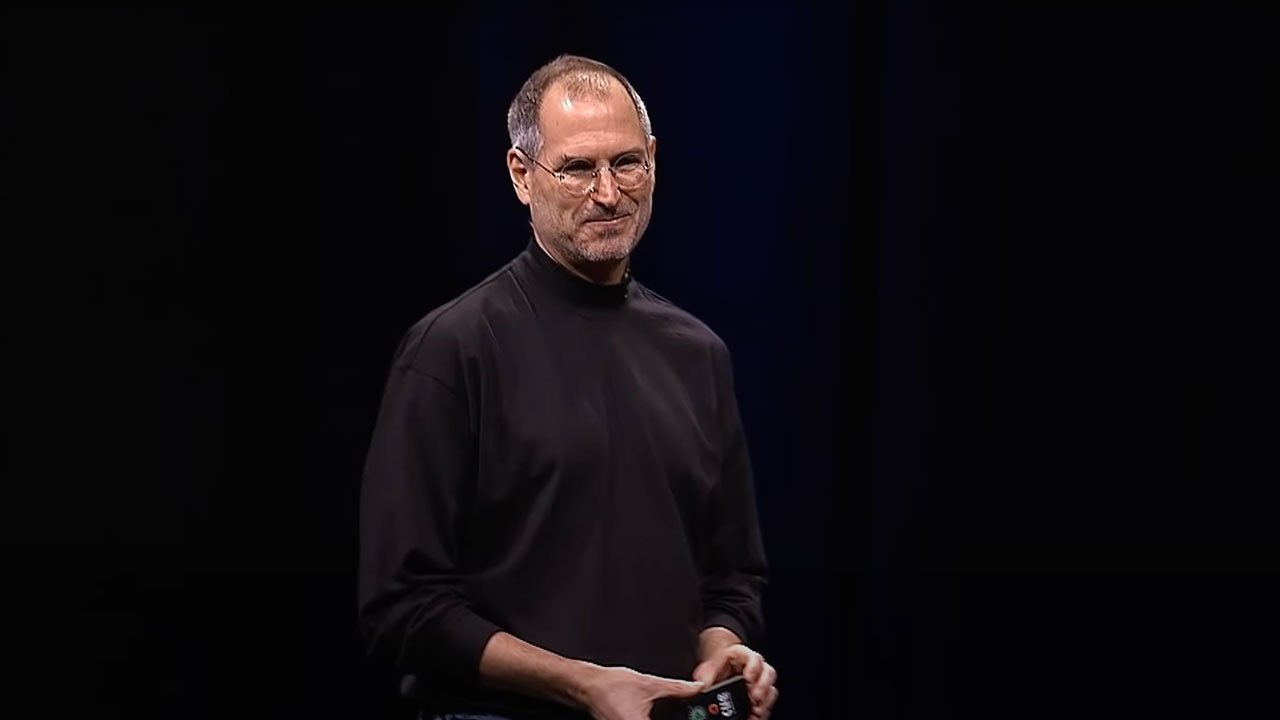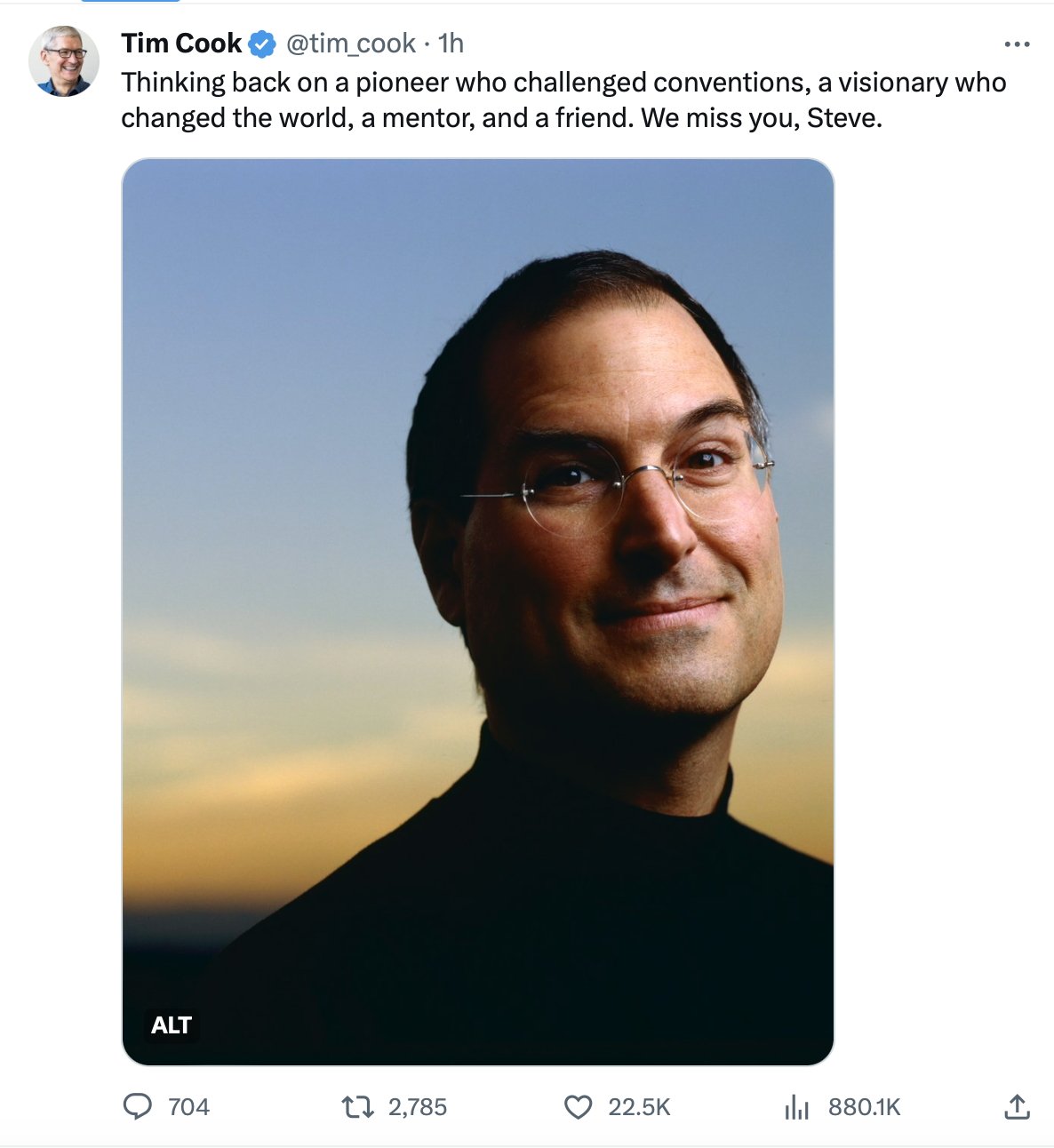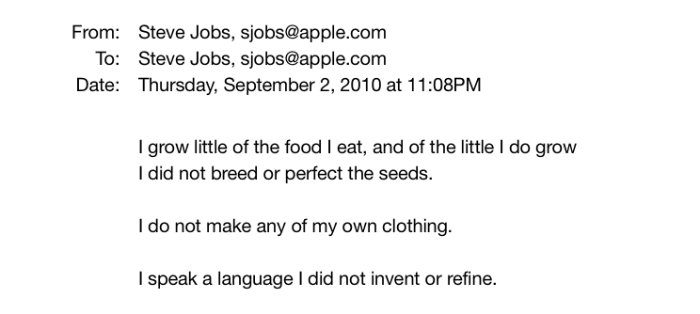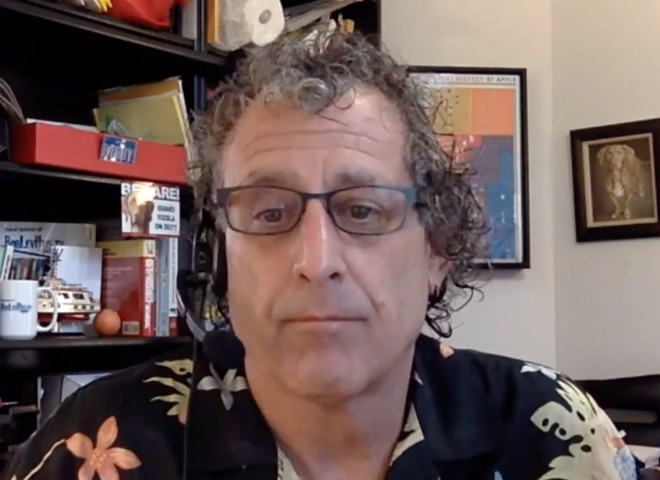Commemorating Steve Jobs and his continuing influence on technology
More than a decade after his death, Apple co-founder Steve Jobs continues to influence the world. AppleInsider explores what the man himself thought about living and dying, and how his online archive is commemorating him and his work.

Apple co-founder and former CEO Steve Jobs.
Every year since Jobs died, Apple has marked the anniversary with tributes, including turning over its homepage to a memorial. In 2021, the homepage included a personal message from Jobs's widow, Laurene Powell Jobs, and a three-minute video about the man.
For 2023, Tim Cook tweeted a memory of the man.

Tim Cook's 2023 tweet about Steve Jobs
Ahead of the 11th anniversary of his death in 2022, Cook joined with Powell Jobs joined and Jony Ive to talk about him on stage.
During that Code22 panel discussion with Kara Swisher, Powell Jobs also launched the Steve Jobs Archive online.
Intended to be a growing tribute, and specifically a growing inspiration that would later include a book, the archive began with an email from Steve Jobs -- to himself. Reportedly, Jobs would often email himself notes and thoughts, but this particular one was an acknowledgement of how he, and all of us, depend upon each other.

Start of an email Steve Jobs sent himself. (Source: The Steve Jobs Archive)
"I love and admire my species, living and dead, an am totally dependent on them for my life and well being," he says at the conclusion of his email. "Sent from my iPad."
Jobs's death in 2011
Apple co-founder Steve Jobs died at around 3:00 p.m. Pacific Time on Wednesday October 5, 2011. He was at his Palo Alto home. The Santa Clara County Public Health Department recorded the immediate cause of death as respiratory arrest but that "metastatic pancreas neuroendocrine tumor" was the underlying cause.

Flowers left outside Steve Jobs's Palo Alto house
Later that day, his wife Laurene Powell Jobs issued a statement.
Steve died peacefully today surrounded by his family.
In his public life, Steve was known as a visionary; in his private life, he cherished his family. We are thankful to the many people who have shared their wishes and prayers during the last year of Steve's illness; a website will be provided for those who wish to offer tributes and memories.
We are grateful for the support and kindness of those who share our feelings for Steve. We know many of you will mourn with us, and we ask that you respect our privacy during our time of grief.
Jobs was 56 years old and had been being treated for this rare form of pancreatic cancer since he was 49. Consequently he had been conscious of his health when giving a commencement speech at Stanford University in 2005. He chose to speak about mortality.
At that point, he had already had a successful operation to remove a tumor but in 2009 he took an extended leave of absence from Apple to undergo further treatment. He had a liver transplant and at the September 2009 Apple event thanked his donor.
"I now have the liver of a mid-20s person who died in a car crash and was generous enough to donate their organs," said Jobs. "I am alive because of their generosity."
We now know that Jobs had refused Tim Cook's offer of a liver transplant but in this same speech he thanked Cook and others for how they "rose to the occasion".
Cook would again take over while Jobs went on another medical leave of absence in January 2011.
Jobs's final public appearance was on June 7, 2011, representing Apple at a Cupertino county meeting where he spoke about plans to build Apple Park.
Just under three months later on August 24, 2011, Jobs formally stepped down as Apple CEO. On his last day he reportedly chaired a board meeting, tried to fool a pre-release version of Siri with questions, and then rode home with Apple attorney George Riley.
That evening, he told biographer Walter Isaacson that "I've had a very lucky career, a very lucky life. I've done all that I can do."
The day he died
AppleInsider managing editor at the time was Neil Hughes. He wrote Steve Jobs's obituary for the site on that day.
"I was at the gym, and I got a bunch of calls. The news broke late and I rushed home to cover it. For me it was a story -- I wasn't really emotional at the time, I was just in work mode, covering it as it needed to be covered," he said. "From a news perspective, I kind of knew it was coming, but it was still unexpected. You just assume a guy like that will live forever."
Journalists write obituaries regularly and you don't put your personal reaction into these pieces. After the work is done, though, things are different.
"I never realized I had a 'relationship' with Steve until later," Hughes said. "There was a lawsuit that involved emails between Eddy Cue and Steve. Something about iBooks. And Steve read one of my stories and actually learned something about his own company from it. The truth is Apple always paid attention, including Steve."
Writer Bob LeVitus, who Steve Jobs would occasionally quote on slides in keynote presentations, says now that even though his death had been expected, it was upsetting. "I was really sad when he died. It was like the end of an era," he remembers.

Bob "Dr Mac" LeVitus
"He was one of those once in a generation guys," says LeVitus. "He was brilliant. Apple isn't going to be the same after Steve. I think Tim Cook tries really hard to keep the spirit of Apple alive and the way Steve would've wanted it. [However] as the company gets bigger and bigger it gets harder and harder to stay true to doing everything excellently."
"I don't know what the next big thing is but I don't know that Apple will hit on it without Steve," continues LeVitus. "Maybe. There's so many smart people at Apple that I'm sure something good will come out of it but Steve was the one that said let's build an MP3 player fo real people who are not geeks. And let's build a phone that actually is smart."
Legacy
As news of Jobs's death broke, friends, colleagues and former rivals spoke about him. Microsoft founder Bill Gates said: "The world rarely sees someone who has had the profound impact Steve has had, the effects of which will be felt for many generations to come. For those of us lucky enough to get to work with him, it's been an insanely great honor. I will miss Steve immensely."
On October 19, 2011, Apple held a memorial service for Jobs. It was initially a private event for employees and live-streamed only to Apple Stores around the world. Around a week later, Apple released the video publicly. That video is no longer available on Apple's site but a memorial page is. You can read a selection of people's memories about Steve Jobs and still contribute your own.
Apple continues to maintain that page and every year, Tim Cook pays tribute to Jobs on the anniversary of his death, with tweets such as this one in 2020:
"A great soul never dies. It brings us together again and again." -- Maya Angelou. You're always with us Steve, your memory connects and inspires us every day. pic.twitter.com/X85bjObkPK
-- Tim Cook (@tim_cook)
Writing in 2021, ex-Apple Chief Designer Jony Ive says it was a "brutal, heartbreaking day" when Jobs died.
"After he died, I walked out into the garden," wrote Ive. I remember the sound of the latch on the wooden door as I gently pulled it closed. In the garden, I sat and thought how talking often gets in the way of listening and thinking."
"Perhaps that is why so much of our time together was spent quietly," he continued. "I miss Steve desperately and I will always miss not talking with him."
Read on AppleInsider



Comments
The people closest to him will miss him. The people who admired him for what he did will always take a moment on his anniversaries to acknowledge him.
A tribute to Steve Jobs on an Apple-centric website is never out of place.
He gave the keys to Tim Cook and told him to run it as he saw fit - not as he thought he (Jobs) would. He was wise enough to know that all companies change after the founder leaves the stage - Disney, Ford, Microsoft, CBS and endless others changed after the iconoclastic founder died or stepped away. Just as Tesla and Space X will after Elon leaves.
Just my speculation, but I think had he survived his cancer Jobs was preparing to step away from day to day running of Apple. That yacht he built and the age of his children at that time seems to imply he was wanting to refocus his life closer to home and family. It is truly sad that he was unable to see that day.
The people who built Apple v1 are all gone from the company now and most of the core group that were with Jobs during the return and rebuilding v3 have left the company. It is a very different place now and many times larger than the company was even at the time of his passing. It is now very much the company built by Tim Cook.
Most of my professional... and home... life has long been intertwined with the technology that he and Steve Wozniak invented.
I bow to them both.
*As an aside I don’t think the same is true of Gates. He was a ruthless businessman, but I don’t believe he instigated change in the way Jobs did. Under his management, Microsoft copied and bought its way to dominance, but it and he were never as creative as Jobs and Apple.
Apple's share price when Steve died was approx $14. Today it sits at $226. And it got there based on innovation under Cook, with his chief accomplishment being Apple Services, which didn't exist under Jobs. See, while you're busy bemoaning no Apple Car, Apple Services nearly generates the gross revenue of Tesla (and will surpass it soon) but at 4X the gross profit margin of Tesla. Hmmmm... so which is the better business? Ranked by revenue, Apple Services, if listed as a separate company, would be in the upper 10% of all Fortune 500 companies, and if ranked by profit margin it would be #1 at an eye-popping 70%+. But yeah, nothing to see here. Tim Cook has no vision.
Then there's Apple Watch, the most successful watch in the 200-year history of watches and the product that established wearable health tracking for the masses as a thing. And AirPods, the most successful earphone/headphone in the whole history of that category, a product that rewrote the book for the world on how people listen to music... but yeah, no innovation under Cook. Both are part of the Wearables category which also didn't exist under Jobs. Apple car wasn't "a dud," it was a product cancelled during development because there was no profitable way forward to justify its continuation--that's called smart business management.
As for Vision Pro being a dud--that's hilarious for a product that has been in the hands of consumers for all of 32 weeks. Please cite fact-based sources for its "failure" that include Apple's actual internal projection for sales and how actual sales have fallen short of that number. Not unsourced rumors, not guesses from unnamed supply chain sources, actual facts that have appeared in print. I'll wait. Better still, here's a real dud: Meta's reality headsets, which have been on the market for 10 years and continue to lose $1 billion per month.
But there was nothing like the excitement leading up to an Apple Event with Jobs, you just never knew what was going to happen but you wanted whatever it was.
Jobs made Apple the globally most valuable company.
What it really needs is a major technology breakthrough like how the multi-touch glass interface enabled the iPhone. There's a missing piece for AR and they are stuck with trying to shoehorn technology that's currently available to make it work.